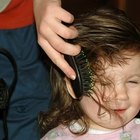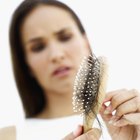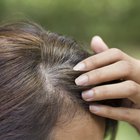
Searching for the fountain of youth has been going on since the first gray hair made its appearance. Although gray hair can appear at any age, it is often one of the first signs of aging, and many products have been developed to prevent or mask them. It is rumored that zinc can help restore a person's natural color.
Functions of Zinc
Zinc is an element present in the human body with largest concentrations found in the hair, bones, muscle and skin. Zinc also is found in enzymes, where it plays a pivotal role in many metabolic processes. It is required for normal physical development and reproductive health and it supports the immune system as well. Although zinc is found in the body, it is not stored and your body requires dietary intake to meet its daily needs.
Causes of Gray Hair
A study described in the “Federation of American Societies for Experimental Biology” journal revealed that a buildup of hydrogen peroxide disrupts melanin in the hair shaft and throughout the body, causing gray hair. Melanin is what gives our hair its color and our skin its pigmentation. Smoking also has been found to influence early graying, and genetics plays a significant role in determining when gray hair appears. Zinc does not appear to play a significant role in hair color.
Significance
According to the “Biological Trace Element Research” journal, a study was conducted to determine the level of trace elements in human hair. Though this study did not focus on the causes of graying in hair, it did reveal that all colors of hair contain levels of zinc. Brown hair contained more zinc than light blond hair, but the difference was slight. Very dark brown or black hair had the highest concentrations of zinc. Copper also is found in hair, and it was noted that as the study subjects got older, the copper content decreased in brown and blond hair. There was no change in zinc concentrations.
Considerations
While there is no definitive evidence that zinc directly impacts hair color, there might be benefits to using zinc on your hair. The “British Journal of Dermatology” released a study that showed promising results on the use of zinc shampoo for thinning hair. The shampoo not only significantly increased the numbers of hairs, it also slightly increased the thickness. It is important to note that test subjects in that study used zinc shampoo topically and did not ingest zinc internally.
Warning

The human body requires a daily intake of zinc to maintain normal processes and, in children, it aids in their development. The recommended daily intake is 12 to 15 mg for adolescents and adults. These values differ by age and if you are pregnant or breastfeeding. Supplementation of additional zinc above the recommended intake should be done with caution. An overdose of zinc can cause dizziness, fainting, stomach upset, chest pain and vomiting.
Related Articles

Can Supplements Reverse Gray Hair?

Facts on Natural Hair Changing Color

How Are Hair Colors Inherited?

Dominant & Recessive Hair Colors

How Does Facial Hair Grow Get Lighter ...

What Are the Benefits of BioSil?

What Are the Causes of Graying Hair?

Traditional Uses of Cuscuta

What Foods Provide Calcium D-Glucarate?

Is Zinc Good for Hair Growth?

The Effects of Vitamin-D Deficiency on ...

Grecian Formula Problems

What Is PABA in Sunscreen?

What is Hair Composed of?

What Vitamins Help the Liver?

What Are the Causes of Hair Shedding in ...

The Role of Collagen & Melanin in Skin

How to Correct Gold Tones in Hair Color

What Are the Dangers of 6 Oxo?

Chlorella and Hair Loss
References
- Acu-Cell Nutrition: Zinc & Potassium
- “The Journal of Nutrition”; Dorea, JG., Pereira, SE.; The influence of hair color on the concentration of zinc and copper in boys' hair; November; 1983]
- “British Medical Journal”; Mosley, JG., Gibbs, A.; Premature grey hair and hair loss among smokers: a new opportunity for health education?; December; 1996
- “Biological Trace Element Research”; Sturaro, A. et al.; The influence of color, age, and sex on the content of zinc, copper, nickel, manganese, and lead in human hair; January; 1994
Resources
Writer Bio
Haylee Foster has been writing health and fitness articles since 1999. She received prenatal fitness certification from Desert Southwest Fitness in 2001 and has also given presentations on women's and children's health and prenatal fitness. She has a Bachelor of Science in lifestyle management with an emphasis in fitness and nutrition from Weber State University.
Photo Credits
Tony Garcia/Lifesize/Getty Images